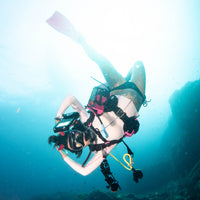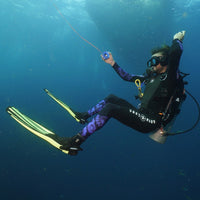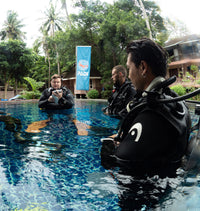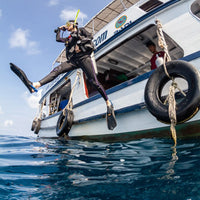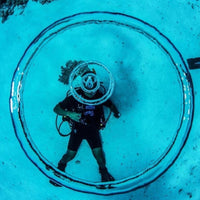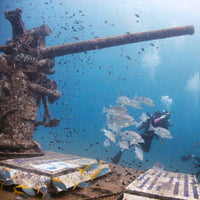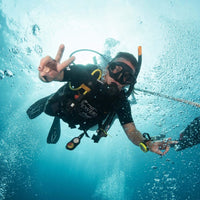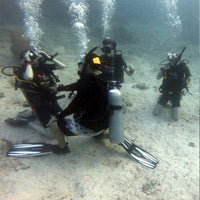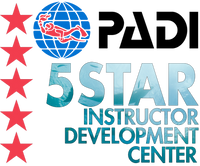Pro Diving
Become a Professional Diver!

As a PADI Career Development Center (CDC), we are proud to be part of the highest level of PADI dive training centers, offering world-class training and support to help you achieve your diving career goals. Unlike other dive centers, our CDC status guarantees that you receive unparalleled training and support throughout your career journey. From your first steps as a Divemaster to achieving your Open Water Scuba Instructor (OWSI) certification and beyond, we’re here to guide you every step of the way.
Becoming a professional diver is an exciting and life-changing decision, but it also comes with a serious commitment. Diving, even as a hobby, requires both physical and mental focus. As a professional diver, you’ll be guiding others through their own challenges, and to do this effectively, you need not only excellent training but also the right support to grow both professionally and personally.
At Coral Grand Divers, we provide the ideal environment for your professional development. With inspiring Course Directors, experienced Staff Instructors, a dedicated diving classroom, and an on-site pool, you’ll gain the knowledge and skills needed in a safe, controlled setting. This allows you to build confidence as a diver and ensures you're fully prepared for the challenges of the diving world.
Divemaster (or "DM")
The Divemaster (or "DM") qualification is the first step of the Pro ladder. To become a Divemaster, you need to take the PADI Divemaster course and have passed a few other milestones: you need 40 logged dives before you can start the course, and for qualifying, you need to have at least 60. You should consider these criteria as minimal requirements; the more time you spend underwater, the more diving experience you gain. Once qualified as a Divemaster, you can guide certified divers on "fun dives" and help instructors train new divers.
Topics and hands-on workshops include:
- Role and Characteristics of the PADI Divemaster
- Supervise general diving activities and assist during training
- Diver safety and risk management
- Divemaster-led programs and activities related to PADI's specialties
- Diving business and your diving career
- Knowledge of the diving environment
- Prepare and manage a dive. Map a dive site in the natural environment
- Conduct dive briefings
- Organize a search and recovery project and a deep dive
- Conduct a ReActivate refresher program and a Skin Diver freediving course
- Act as an assistant during Discover Scuba Diving programs and lead Discover Local Diving programs
The best pro divers know that "time in the water" is the best teacher, and you need as much experience as possible when starting. If you are serious about making a living as a professional diver, it can be tempting to rush into the Divemaster course to get certified and start working. Coral Grand Divers offer "Divemaster Internships", which are long-term programs (from one month) where you will be involved in the day-to-day workings of the dive center while undergoing your Divemaster training in steps. It's worth investing time and money in a reputable center that will train and mentor you while giving you a solid hands-on experience with clients.
Open Water Scuba Instructor (or "OWSI")
If you love people, are passionate about diving, and want an extraordinary life - become a PADI Open Water Scuba Instructor (or "OWSI").
To become an OWSI, you must have the Divemaster qualification and have completed at least 100 dives.
The Instructor Development Course (IDC) is made up of two parts - the Assistant Instructor (AI) course and the Open Water Scuba Instructor (OWSI) program. Most dive professionals complete an entire IDC and then participate in an Instructor Examination (IE), the final step to earning a PADI Instructor certification.
The IDC initial course covers the basics of diving physics and physiology to refresh your knowledge before getting into the thick of it. Coral Grand Divers is one of the few diving schools offering an IDC preparatory course. Think about what you will do after passing your IE. Coral Grand Divers is a top-tier IDC
center. We offer various options, including training after the IE, such as some specialty courses, which will allow you to be well-prepared when looking for a job. It's fantastic to be as versatile as possible in what you can teach, and that's where PADI Specialty Instructors come in.
The main topics include:
- PADI Standards and Procedures, plus in-water workshops for courses you can teach
- Learning, teaching, and the PADI System
- Risk management and diver safety
- The diving business and your role as an instructor
- Dive Marketing and Tips to Improve Sales
After passing your IDC, you can stay for a few months and complete your Master Scuba Diver Trainer (MSDT).
Master Scuba Diver Trainer (MSDT)
Most instructors become Master Scuba Diver Trainers, or "MSDT". There is no course or exam for this, but you must complete several steps before qualifying. You will need to have certified at least 25 PADI divers and the ability to teach five specialties, so you will need to pass the requirements of five PADI Specialty Instructor courses. An MSDT internship is an ideal way to gain experience while teaching enough students to earn this level of certification.
The MSDT level is a prerequisite for the IDC Staff Instructor and many TecRec Instructor levels.
Similarly to the Divemaster Internship, the MSDT is a longer-term program where you will work alongside instructors to gain hands-on teaching experience. It can be a big commitment, but it's a surefire way to build confidence in your skills before landing your first paid job as a professional.
IDC Staff
As divers look to the Divemaster, instructor candidates respect IDC Staff Instructors. As the name suggests, these assist with Instructor training and share their wisdom and experience with new PADI Leaders. The IDC Staff Instructor course gives you in-depth knowledge of the instructor training process and prepares you to shape the new generation of PADI professionals. It's also a great career choice.
After a pre-assessment of your instructor-level knowledge of dive theory, exemplary demonstrations of dive exercises, and model instructional presentation techniques, you will participate in sessions:
-
Instructor Training Program Standards, Procedures, and Content
- How to Organize and Run the PADI Assistant Instructor Course
- Psychology of Assessment and Counseling
- Evaluate educational presentations in the classroom, in protected environments, and open water
In addition, you will attend an IDC or learn to teach many components of the program.
As an IDC Staff Instructor, you can independently teach PADI Assistant Instructor courses and function as an assistant during IDCs and other continuing education courses at the instructor level.
Check out our PADI Go Pro packages to become a PADI pro from zero to Hero!


